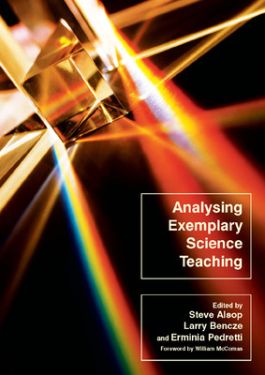Analysing Exemplary Science Teaching
Receive via shipping:
- Colour, print bound version of the complete text
Foreword: Exemplary practice as exemplary research
William F. McComas
General Preface
Acknowledgements
INTRODUCTION: Creating possibilities?Steve Alsop, Erminia Pedretti and Larry Bencze
PART 1: Accounts of Exemplary practice
Account 1: Kidney function and dysfunction: enhancing an understanding of science and the impact on society ?Keith Hicks
Account 2: Episodes in physics ?George Alex Przywolnik
Account 3: Recollections of organic chemistry? Josie Ellis
Account 4: The science class of tomorrow? ?Richard Rennie and Kim Edwards
Account 5: Science with a human touch: historical vignettes in the teaching and learning of science?Karen Kettle
Account 6: Exploring the nature of science: re-interpreting Burgess Shale fossils ?Katherine Bellomo
Account 7: Motivating the unmotivated: relevance and empowerment through a town hall debate ?Susan A. Yoon
Account 8: Mentoring students towards independent scientific inquiry ? Alex Corry
Account 9: Learning to do science ?Gabriel Ayyavoo, Vivien Tzau and Desmond Ngai
Account 10: Practice drives theory: An integrated approach in technological education ?James Johnston
PART 2: Account Analysis
Analysis 1: Challenging traditional views of the nature of science and scientific inquiry?Derek Hodson
Analysis 2: Developing arguments ?Sibel Erduran and Jonathan Osborne
Analysis 3: STSE Education: principles and practices ?Erminia Pedretti
Analysis 4: Conceptual development ?Keith Taber
Analysis 5: Problem-based, contextualised learning? Ann Marie Hill and Howard Smith
Analysis 6: Motivational beliefs and classroom contextual factors: exploring affect in accounts of exemplary practice?Steve Alsop
Analysis 7: Instructional technologies, technocentrism and science education ?Jim Hewitt
Analysis 8: Reading accounts: central themes in science teachers' descriptions of exemplary teaching practice ?John Wallace
Analysis 9: Equity in science teaching and learning: the inclusive science curriculum?Leonie Rennie
Analysis 10: School science for/against social justice? Larry Bencze
PART 3: Possibilities, accounts, hypertext and theoretical lenses
Reflection 1: Voices and viewpoints: what have we learned about exemplary science teaching?? Erminia Pedretti, Larry Bencze and Steve Alsop
Reflection 2: Integrating educational resources into school science praxis? Larry Bencze, Steve Alsop and Erminia Pedretti
References
Index
Professor Michael Reiss, Institute of Education, University of London
"Provides an important new twist on one of the enduring problems of case-based learning... This is a book that deserves careful reading and re-reading, threading back and forwards from the immediate and practical images of excellence in the teachers’ cases to the comprehensive andscholarly analyses in the researchers’ thematic chapters."
Professor William Louden, Edith Cowan University, Australia
Through a celebration of teaching and research, this book explores exemplary practice in science education and fuses educational theory and classroom practice inunique ways.
Analysing Exemplary Science Teaching brings together twelve academics, ten innovativeteachers and three exceptional students in a conversation about teaching and learning.Teachers and students describe some of their most noteworthy classroom practice,whilst scholars of international standing use educational theory to discuss, define andanalyse the documented classroom practice.
Classroom experiences are directly linked with theory by a series of annotatedcomments. This distinctive web-like structure enables the reader to actively movebetween practice and theory, reading about classroom innovation and then theorizingabout the basis and potential of this teaching approach.
Providing an international perspective, the special lessons described and analysed aredrawn from middle and secondary schools in the UK, Canada and Australia. This bookis an invaluable resource for preservice and inservice teacher education, as well as forgraduate studies. It is of interest to a broad spectrum of individuals, including trainingteachers, teachers, researchers, administrators and curriculum coordinators in scienceand technology education.

